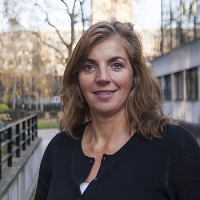Clare Elwell - 2020 SPIE Women in Optics Planner
Professor
University College London, United Kingdom
 |
Country of Birth: United Kingdom
|
My mum worked as a nurse at the local hospital and this sparked an interest in medicine for me. I was fully set to study medicine when, at aged 17, I attended the London International Youth Science Forum which brings together hundreds of young science students from all over the world. During the forum, I heard a talk about medical physics and I realized this would combine my two favorite school subjects, maths and physics, with my interest in medicine.
I develop optical technologies using near-infrared spectroscopy (NIRS) to image the human brain. The portable and noninvasive nature of NIRS means it can bridge gaps not met by conventional brain imaging technologies. I currently lead the Brain Imaging for Global Health (BRIGHT) project which was responsible for the first brain imaging of infants in Africa. We’re using NIRS to investigate the impact of malnutrition on infant brain development and inform effective interventions. Optical imaging is particularly well suited to studies in low-resource settings and as a tool in global health projects.
Maintaining a work-life balance is important to me. I have two children and worked part time for 18 years whilst growing and leading a number of large multidisciplinary research teams. I was told that I would never make professor on this basis, but I did. I believe that we need to give women choices for how they wish to manage their careers — part-time working doesn’t work for everyone but it did for me and I’d like to see more women seeing this as a viable option for a successful career in STEM.
Academic life is full of ups and downs. It’s a cliché, but we really do learn something valuable from each of our failures and this helps us move forward more effectively. It’s also important to take time out to think. I swim regularly and find that’s a great space to focus my mind and solve problems. Be brave, relish the challenge and reward that a career in STEM brings, and be prepared to be the first.